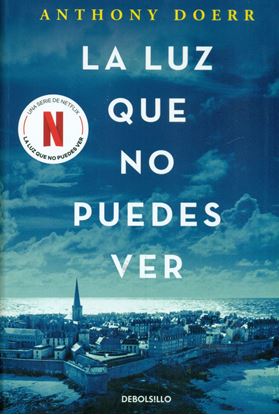

LA LUZ QUE NO PUEDES VER (LI) (BOL)
Marie-Laure vive con su padre en París, cerca del Museo de Historia Natural, donde él trabaja como responsable de sus mil cerraduras. Cuando, siendo muy niña, Marie-Laure se queda ciega, su padre le construye una perfecta miniatura de su barrio para que pueda memorizarla gracias al tacto y encontrar el camino a casa. A sus doce años, los nazis ocupan París y padre e hija tienen que huir a la ciudad amurallada de Saint-Malo. Con ellos se llevan la que podría ser la más preciada y peligrosa joya del museo.
600
450
EL CUENTO DE LA CRIADA (LI) (BOL)
Amparándose en la coartada del terrorismo, unos políticos teócratas se hacen con el poder y, como primera medida, suprimen la libertad de prensa y los derechos de las mujeres. Esta trama, inquietante y oscura, que bien podría encontrarse en cualquier obra actual, pertenece en realidad a esta novela escrita por Margaret Atwood a principios de los ochenta, en la que la afamada autora canadiense anticipó con llamativa premonición una amenaza latente en el mundo de hoy.
En la República de Gilead, el cuerpo de Defred sólo sirve para procrear, tal como imponen las férreas normas establecidas por la dictadura puritana que domina el país. Si Defred se rebela -o si, aceptando colaborar a regañadientes, no es capaz de concebir- le espera la muerte en ejecución pública o el destierro a unas Colonias en las que sucumbirá a la polución de los residuos tóxicos.
600
450
DISPARA, YO YA ESTOY MUERTO (LI) (BOL)
Hay momentos en la vida en los que la única manera de salvarse a uno mismo es muriendo o matando.
A finales del siglo XIX, durante la última etapa zarista, los Zucker, perseguidos por su condición de judíos, tienen que abandonar Rusia huyendo del horror y la sinrazón. A su llegada a la Tierra Prometida, Samuel Zucker adquiere las tierras de los Ziad, una familia árabe encabezada por Ahmed. Entre él y Samuel nace un fuerte vínculo, una sólida amistad que, por encima de las diferencias religiosas y políticas, se mantiene generación tras generación.
Con las amenazas, la sed de venganza y muchas pasiones desatadas como telón de fondo, las vidas entrecruzadas de los Zucker y los Ziad conforman un mosaico de traiciones y sufrimientos, de amores posibles e imposibles, al tiempo que plasman la gran aventura de vivir y convivir en un territorio marcado por la intolerancia.
600
450
LA NIÑA DEL SOMBRERO AZUL (LI) (BOL)
Gijón, verano de 1929. Con apenas diecisiete años, Manuela entra a trabajar como criada en la mansión de los marqueses de Armayor. Rodeada de un lujo que contrasta con la pobreza de su aldea natal, la joven conocerá la arrogancia y el desamor, pero también el arte de la costura, al tiempo que entablará una amistad inquebrantable con la única heredera de la familia, Alexandra.
Años después, y pese a pertenecer a mundos muy distintos, su amiga será su mayor apoyo cuando la Guerra Civil obligue a Manuela a separarse de su hija Telva, enviada a Rusia junto con otros niños de la zona republicana, y también cuando intente recuperarla décadas más tarde, aunque para ello deba arriesgarlo todo.
600
450
COMO (NO) ESCRIBI NUESTRA HISTORIA (LI)
Elsa Benavides es una escritora de éxito con una crisis creativa y una obsesión: matar al personaje que la catapultó al éxito. Pero la solución a sus problemas no pasa por electrocutar a Valentina con un móvil en la bañera. Es la punta del iceberg de una herida más profunda.
Decidida a huir para volver a abrazar la escritura, se topa con Darío, un músico recién llegado de París que además es su vecino. Empieza así una nueva historia en la que Elsa es la protagonista. ¿Será capaz de contarlo todo?
600
450
LA CHICA DE NIEVE (LI) (BOL)
Nueva York, 1998, cabalgata de Acción de Gracias. Kiera Templeton, desaparece entre la multitud. Tras una búsqueda frenética por toda la ciudad, alguien encuentra unos mechones de pelo junto a la ropa que llevaba puesta la pequeña.
En 2003, el día que Kiera habría cumplido ocho años, sus padres, Aaron y Grace Templeton, reciben en casa un extraño paquete: una cinta VHS con la grabación de un minuto de Kiera jugando en una habitación desconocida.
600
450














